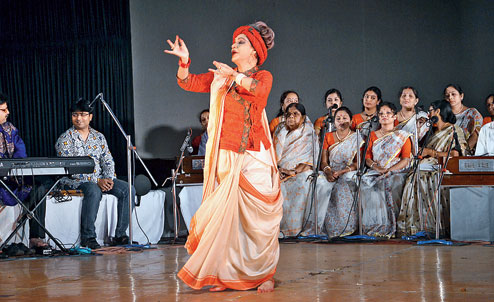 |
To commemorate the 90th birth anniversary of Suchitra Mitra, Purabi organized a programme, Tomar Surer Dhara, at Rabindra Sadan. The event commenced with three inaugural songs (“Andhakarer utsa hote”, “Nitya tomar je phool phote” and “Prana bhoriye”), presented by 150 disciples of Suchitra Mitra from various institutions.
It was followed by a programme on Tagore’s bhanga gaan. Rabindrasangeet, especially those derived from Hindustani classical music, Indian or Western folksongs and tunes, are broadly categorized as bhanga gaan. The programme commenced with the song, “Amar sonar Bangla”, from an old recording of Suchitra Mitra. Senior artist Alokananda Roy presented a pleasing choreography with this song. Agnibha Bandyopadhyay sang “Kothay pabo tare”, “Khanchar bhitor” and “Se je moner manush”. “Madhur rupe birajo” was presented with the original Dhrupad-style song, “Kaun rup bane ho”, by Shamita Mukherjee and Shubhra Saha.
The Chennai-based organization, Konark Odissi Dance Academy, presented the traditional song, “Nachata Tribhanga re” and the Rabindrasangeet, “Bipul taranga re”, led by Sanhita Basu Ghosh. “Eri ava ananda” was presented by Trishit Choudhury while Sanjukta Biswas beautifully sang the Rabindrasangeet, “Danrao man ananta”. Aindrila Ganguly made the dance presentation. This programme brought out the many traditional Hindustani songs of the kheyal and dhrupad genre that are rarely known and heard. They had inspired Tagore to create his immortal songs. “Bahe mirantara” followed the structure of “Dusaha dukha dalani”, sung by Trishit Choudhury and Mandira Mukhopadhyay.
The dance presentation by Paulami Chakraborty and Debasmita Ghosh was also attractive. “Sukhaheen nishidin” was the extract from a tarana, “Dara drim drim”. Trishit Choudhury and Shamita Mukherjee gave an enchanting rendition of both the songs. The audience appreciated the songs, “Kar milana chao”, sung well by Shubhra Saha, and the original version, “Tanu milana de paravar” (chorus). “O miya be januwale” and “Mohe kayse niki lage” sung by Trishit Choudhury enhanced the beauty of Mandira Mukhopadhyay’s generous rendition of “E parabase” and “Dake bar bar dake”.
The programme was not confined to the classical territory. The singers also came up with the essence of the Western tunes which had influenced Tagore. The German version of “Alo amar alo” (“O do mine”), sung by Arnab Neel Mukherjee, left a mark. The kids’ chorus dance performance was one of the main attractions. The folk song, “Hari nam diye”, by Sayani Chatterjee and Sayantani Chakraborty was praiseworthy. Mandira Mukhopadhyay’s “Jodi tor dak shune”, where all the performers appeared on stage, formed the perfect conclusion to the musical evening. The melodious script reading by Subir Mitra and Suparna Ghoshal added a new dimension to this exceptional presentation. The accompaniment by Subrata Mukherjee on keyboard, Soumyajyoti Ghosh on flute and Kanchan De on tabla was perfect. Purabi introduced from this year the Suchita Mitra Smarak Samman, which was conferred on the senior Rabindrasangeet artist, Sumitra Sen.










